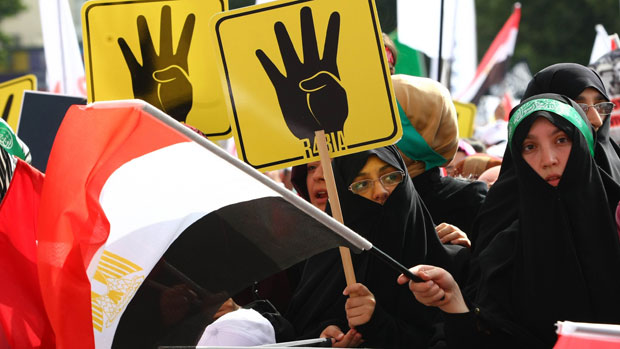Egypt's Rab'a massacre: what we know now
A year after 1,000 people died in Cairo's Rab'a Square, investigators says mass killings went 'according to plan'

A free daily email with the biggest news stories of the day – and the best features from TheWeek.com
You are now subscribed
Your newsletter sign-up was successful
Egyptians are commemorating the first anniversary of the mass killings which took place in Rab'a Square in Cairo a year ago, as a report published by Human Rights Watch reveals new information about the massacre.
Between 800 and 1,000 Muslim Brotherhood supporters were killed by Egyptian security forces in the centre of the Egyptian capital. The protesters had gathered to stage a sit-in against the military coup, but soon came under violent attack from the armed forces.
Human Rights Watch director Kenneth Roth accuses the Egyptian authorities of orchestrating "one of the world's largest killings of demonstrators in a single day in recent history".
The Week
Escape your echo chamber. Get the facts behind the news, plus analysis from multiple perspectives.

Sign up for The Week's Free Newsletters
From our morning news briefing to a weekly Good News Newsletter, get the best of The Week delivered directly to your inbox.
From our morning news briefing to a weekly Good News Newsletter, get the best of The Week delivered directly to your inbox.
Following a year-long investigation, the report entitled 'According to Plan' presents several conclusions about the massacre:
It was planned
The report alleges that the attack had been planned by military officials at the "highest levels". The military "systematically and intentionally used excessive lethal force in their policing" that day, it says. Investigators present what they say is proof that in planning the dispersal, security officials said they anticipated the death toll to reach the thousands.
The brutal manner in which security forces dispersed protesters "resulted in a shocking death toll that anyone could have foreseen, and indeed the government had anticipated", Roth said.
A free daily email with the biggest news stories of the day – and the best features from TheWeek.com
It may amount to a war crime
Rab'a has been compared to other violent suppressions of dissent, with human rights campaigners likening it to the 1989 Tianamen square massacre in Beijing. The extent of the killings and the systematic way in which they were carried out "suggests that they were part of a policy to use lethal force against largely unarmed protesters on political grounds" and thus they "most likely amount to war crimes", Roth said.
Justice has not been delivered
Many of the high-ranking officials accused of involvement in the massacre still hold power in Egypt today, and no one has been prosecuted for the killings. The report calls for an immediate investigation into the roles played by President Abdel Fatah al-Sisi, who was then head of the armed forces, and several other high-ranking officials. It also said the UN should set up an international inquiry and called on the international community to suspend military trade with Egypt until respect for human rights improves.
Egyptian officials reject the allegations
The Egyptian government has condemned the report, calling it "negative and biased", the Washington Post reports. It accused Human Right Watch of "outrageous interference" by publishing the report and insists the use of force was proportionate and as a direct result of violent provocation from protesters.
But human rights abuses continue
Clampdowns on basic human rights including freedom of assembly and freedom of speech continue across Egypt, the report says, as do mass arrests, torture and a failure to uphold the rule of law. "The legacy of the Rab'a massacre continues to cast a dark shadow over Egypt," Roth said. "Egypt will not move forward until it comes to terms with this bloody stain on its history."
-
 6 exquisite homes with vast acreage
6 exquisite homes with vast acreageFeature Featuring an off-the-grid contemporary home in New Mexico and lakefront farmhouse in Massachusetts
-
 Film reviews: ‘Wuthering Heights,’ ‘Good Luck, Have Fun, Don’t Die,’ and ‘Sirat’
Film reviews: ‘Wuthering Heights,’ ‘Good Luck, Have Fun, Don’t Die,’ and ‘Sirat’Feature An inconvenient love torments a would-be couple, a gonzo time traveler seeks to save humanity from AI, and a father’s desperate search goes deeply sideways
-
 Political cartoons for February 16
Political cartoons for February 16Cartoons Monday’s political cartoons include President's Day, a valentine from the Epstein files, and more
-
 Epstein files topple law CEO, roil UK government
Epstein files topple law CEO, roil UK governmentSpeed Read Peter Mandelson, Britain’s former ambassador to the US, is caught up in the scandal
-
 Iran and US prepare to meet after skirmishes
Iran and US prepare to meet after skirmishesSpeed Read The incident comes amid heightened tensions in the Middle East
-
 Israel retrieves final hostage’s body from Gaza
Israel retrieves final hostage’s body from GazaSpeed Read The 24-year-old police officer was killed during the initial Hamas attack
-
 China’s Xi targets top general in growing purge
China’s Xi targets top general in growing purgeSpeed Read Zhang Youxia is being investigated over ‘grave violations’ of the law
-
 Panama and Canada are negotiating over a crucial copper mine
Panama and Canada are negotiating over a crucial copper mineIn the Spotlight Panama is set to make a final decision on the mine this summer
-
 Why Greenland’s natural resources are nearly impossible to mine
Why Greenland’s natural resources are nearly impossible to mineThe Explainer The country’s natural landscape makes the task extremely difficult
-
 Iran cuts internet as protests escalate
Iran cuts internet as protests escalateSpeed Reada Government buildings across the country have been set on fire
-
 US nabs ‘shadow’ tanker claimed by Russia
US nabs ‘shadow’ tanker claimed by RussiaSpeed Read The ship was one of two vessels seized by the US military